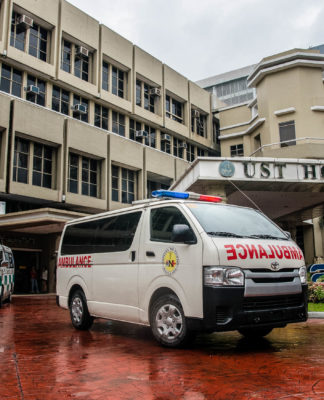WITH the Catholic Church’s over a billion adherents and China’s more than one billion population, any clash between the two could never get less serious.
The dismantled ties between the Holy See and Beijing are again put to the limelight with the ordination of two bishops last April and May by the state-run Chinese Patriotic Catholic Association (CPCA) without Pope Benedict XVI’s approval. Under canon procedure, the Pope appoints bishops or confirms those legitimately elected. The recent ordination of Anhui Bishop Joseph Liu Xinhong and Kunming Bishop Joseph Ma Yinglin thus merited them automatic excommunication.
For many Chinese Catholics, the government’s act was too provocative, and could lead to more Sino-Catholics going underground to reaffirm their fidelity to Rome.
Like Bro. John, a seminarian from the underground church of China who studies at the UST Central Seminary. He refused to disclose his full identity for fear of being identified by the Chinese authorities.
“When you see your brothers and sisters suffering and they cannot profess their faith and live their religious life freely, I realize my responsibility to change the church in China for the better and hope one day we can live our faith as free as here in the Philippines,” Bro. John told the Varsitarian.
Divided we fall
The evangelization of China began with the coming of the Nestorian Christians in 635 in Xi’an city, and the arrival of the Jesuits like astronomer Matteo Ricci in 1582.
The break between the Roman Catholic Church and the Patriotic Catholics goes back to the time when Mao Zedong established the communist People’s Republic of China in 1949, which curtailed freedom of religion and erected state-controlled churches. Then Pope Pius XII excommunicated bishops who accepted non-submission to the Pope, taken as schism under canon law.
“The CPCA is a schismatic church, meaning, it has drifted away from the unity of the Church. China wants the church to be a tool of communism and a tool of the State, but the Church can never succumb to that,” Fr. Lucio Gutierrez, O.P., Regent of the Faculty of Arts and Letters, said.
According to BBC News, CPCA priests are required to “preach the use of contraceptives and to tell people that Mao Zedong has gone to heaven.”
“During the Great Proletarian Cultural Revolution, all the seminaries were closed, the seminarians were sent home, the foreign missionaries were kicked out of China, and all the priests were imprisoned,” Bro. John said. The Red Guards of Mao destroyed Catholic relics and statues and occupied churches. The government forced CPCA to deny papal authority and to reject Catholic doctrines. Through China’s Religious Affairs Bureau, the government makes sure CPCA holds religious practices in accordance with state law.
The CPCA currently has four of the 12 million Catholics in China, although the government said that they do not force Catholics to be members of its state-controlled church. With about eight million believers, the “underground” Chinese Roman Catholics in communion with the Pope and the rest of the Catholics around the world stand firm in defending their faith. Despite constant harassment and arrests from the government, these Catholics secretly maintain contact with the Vatican and those bishops appointed by the Pope.
Stumbling block
During John Paul II’s papacy, ties between the Vatican and the CPCA were more relaxed. China was demanding the Holy See to cede its ties with Taiwan before diplomatic ties could be established between China and the Vatican.
According to Gutierrez, the Holy See had considered cutting its ties with Taiwan until the CPCA ordained the two bishops, which brought back discord between the two camps.
“They (the Chinese government) thought if they set up this diplomatic relationship with Vatican, those Chinese Catholics will be controlled by the Pope and they don’t like that. They don’t like foreign power to enter China,” Bro. John said.
China, in several other occasions, showed its stubborn diplomatic attitude.
For instance, Pope John Paul II was denied visa to visit Hong Kong in 1999. When the Pope died, the Chinese Government lamented the Vatican’s invitation for Taiwanese bishops to attend the funeral. In October 2005, Pope Benedict XVI invited three CPCA bishops and one underground bishop to participate in the Synod of the Eucharist, but the Chinese government refused.
The May 15 issue of Time reported that the Vatican is demanding full diplomatic relations with China by 2008, when Beijing will host the Olympics. It is also hoping for a papal visit to the country on the same year.
“On various occasions, the Holy See has reaffirmed its openness to an honest and constructive dialogue with the competent Chinese authorities to find solutions that will satisfy the legitimate needs of both sides,” Joaquin Navarro-Valls, spokesperson of Pope Benedict XVI, said in a press release.
Navarro-Valls also said that the ordination of bishops “does not only shun favorable dialogue, but also creates new obstacles to it.”
“The Church has to be free to select her own members, her own hierarchy, and her own bishops,” Gutierrez said. “There should be no other political interest.”
“I feel sad that these two bishops were ordained without the approval of the Pope. Personally I want harmony between the two groups; I do not want any division,” Bro. John said. “When I become a priest, I want to work on the dialogue and the harmony between the two groups.”
The Book of Revelations has it that in the end of time, the Church will suffer from the “red dragon.” For some eschatologists, the passage evokes thought of the ongoing persecutions of Christians in China by the millions. The resulting toll in lives has become a tragedy amid an autocracy which the rest of the world can only pray an end for. Nathaniel R. Melican















